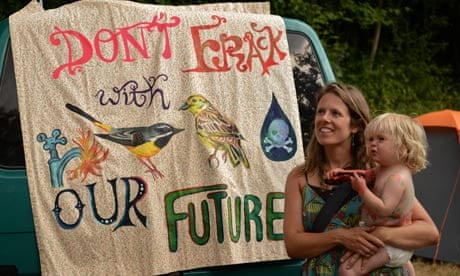An "obsession" with fracking is blinding the government to greener sources of energy, according to proponents who claim the economy will miss out on up to £3bn a year and tens of thousands of jobs by failing to exploit organic biogas.
Figures from the government and the biogas industry show that generating gas from waste can produce cheaper energy in the short term with fewer carbon emissions than current controversial hydraulic fracturing projects.
Alan Whitehead, a Labour MP who sits on the energy and climate select committee, said: "This coalition seems to have an obsession with fracking, to the exclusion of other possibilities, and despite the very clear issues with fracking and the opposition we've seen from local communities. It is very short-sighted."
Whitehead said the current incentives for biogas should be bolstered. "The government is not putting enough behind this. There is a lot at stake and a lot of potential here, but the coalition seems to prefer shale gas, even though it is problematic, than this cheap and readily available form of fuel."
The calls come as protests against oil drilling in the West Sussex village of Balcombe continue, with demonstrators awaiting an influx of new anti-fracking campaigners next weekend. The No Dash for Gas coalition has announced that it intends to bring its camp to Balcombe, which could mean hundreds of people joining the current protest, made up of more than 200 local people and more than 30 tents of activists.
Estimates from the Committee on Climate Change, an independent body that advises parliament, show that at least one in 20 of the UK's homes could be supplied with gas from biomass and waste by 2020.
The Anaerobic Digestion and Biogas Association, the industry trade body, calculates that this could be doubled, and a tenth of the UK's domestic gas needs could be supplied by biogas, given the UK's resources in waste and agricultural products.
Using biogas from waste could save the UK at least 7.5m tonnes of carbon dioxide a year, according to Matthew Hindle, policy manager at the ADBA. That is because the waste would otherwise be sent to landfill or, as it decomposes, release methane – a greenhouse gas 25 to 30 times more powerful than CO2.
Fracking, by contrast, requires substantial amounts of energy to release gas from dense underground rocks, and some of the gas is likely to be flared rather than captured.
Hindle contrasted the government's response to fracking – setting up a new agency, the Office of Unconventional Gas and Oil, to support the industry – with the lack of political interest in biogas, which is rarely mentioned by ministers.
One reason biogas has received less attention is that it falls between three government departments – energy, environment and communities and local government.
At present, according to estimates from the government's Waste Resource and Action Programme, the UK throws away 15m tonnes of food waste a year, from homes, industry and retail. Only about 1m tonnes of the waste is used to generate biogas, or methane, using anaerobic digestion techniquesthat are well-established in other parts of the world. This diverts resources to landfill and gives rise to greenhouse gas emissions, because the rotting food produces methane that is not captured and adds to the concentration of carbon in the air.
About 90m tonnes of animal waste is also produced in the UK each year, only a tiny portion of which is used for energy production. Sewage treatment plants are also overlooked. Biogas can be poured into the national gas grid and used for heating homes, burned to generate electricity, or used in specially adapted vehicles.
Natalie Bennett, leader of the Green Party, said: "Anaerobic digestion needs to be locally based and ideally community or locally owned, rather than having a few large-scale facilities. [Biogas and other renewables] are the energy sources of the 21st century. Fossil fuels are 20th-century dinosaurs – fracking would cause significant local environmental damage, cannot fit within our essential carbon emission limits to avoid catastrophic climate change, and would lock us into future high cost and volatile household energy bills."
In 2010-11, there were more than 2,600 jobs in the biogas sector, which could also be turned to at least 35,000 green jobs with the necessary investment, according to the Department of Environment, Food and Rural Affairs.
But there are currently only 40 megawatts-worth of new projects under construction and a similar number awaiting planning permission. Projects capable of producing a further 180MW have been given the go-ahead. That would be enough to double current production, however this is still tiny compared to a typical fossil fuel power station. Drax, the UK's largest coal plant has a capacity of just under 4,000MW.
Gas from organic sources is, according to people in the biogas industry, slightly cheaper than imported fossil gas, in part because of government incentives. But fracking may prove to be more expensive in the UK. Cuadrilla has already poured £100m into fracking in three years, so far without producing any gas.
Fracking is also likely to take at least five years to produce commercial quantities of natural gas, and although a government-commissioned geological survey found that decades-worth of the fuel are likely to lie below the surface, it is not known how much can be extracted at economically viable rates. Cuadrilla estimates between 0-40% of the total resource. Lord Browne, chairman, told the Guardian the company and its backers would spend "whatever it takes" to produce commercial quantities of fracked gas.
A spokesperson for the Department for Energy and Climate Change said: "We are committed to a secure, diverse energy mix that includes renewables, new nuclear and gas."
Leila Deen, energy campaigner at Greenpeace, said: "With the right policies in place, biogas could provide up to half the UK's domestic heat, reduce landfill and help us achieve our climate change targets. But David Cameron's too tipsy on the fracking kool-aid to acknowledge biogas's potential. If his government put half as much effort into incentivising green energy like biogas as it does into foisting fracking on communities that don't want it, the UK would be well on its way to long term energy security. Biogas would actually help farmers and people in rural communities, rather than incensing them."








Comments (…)
Sign in or create your Guardian account to join the discussion